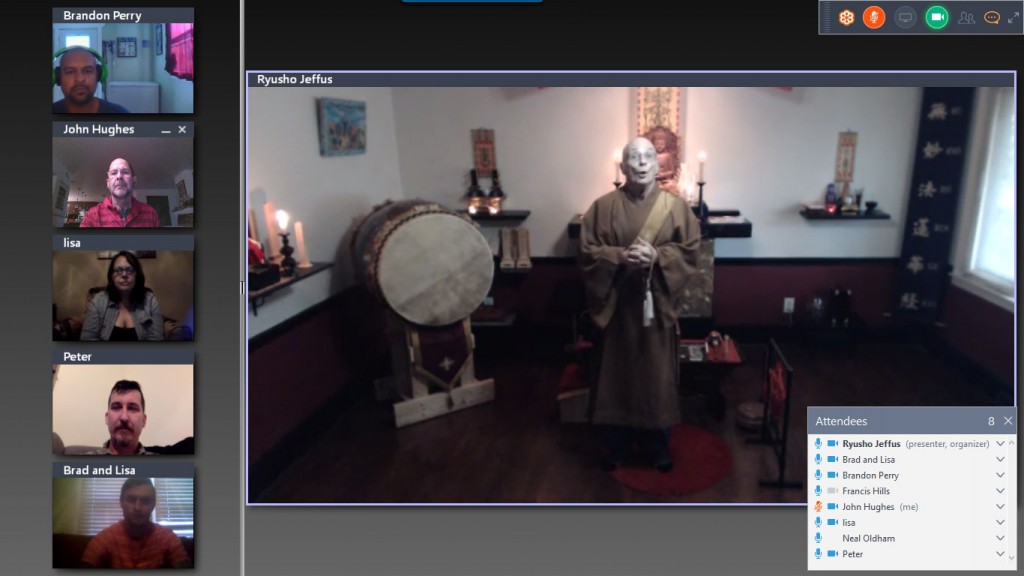Day 17 covers all of Chapter 12, Devadatta, and opens Chapter 13, Encouragement for Keeping This Sutra.
Because of Devadatta:
Devadatta was my teacher. He caused me to complete the six pāramitās. He caused me to have loving-kindness, compassion, joy and impartiality. He caused me to have the thirty-two major marks and the eighty minor marks [of the Buddha]. He caused me to have my body purely gilt. He caused me to have the ten powers and the four kinds of fearlessness. He caused me to know the four ways to attract others. He caused me to have the eighteen properties and supernatural powers [of the Buddha]. He caused me to have the power of giving discourses. I attained perfect enlightenment and now save all living beings because Devadatta was my teacher.
Good to hear:
Good men or women in the future who hear this chapter of Devadatta of the Sūtra of the Lotus Flower of the Wonderful Dharma with faithful respect caused by their pure minds, and have no doubts [about this chapter], will not fall into hell or the region of hungry spirits or the region of animals. They will be reborn before the Buddhas of the worlds of the ten quarters. They will always hear this sūtra at the places of their rebirth. Even when they are reborn among men or gods, they will be given wonderful pleasures. When they are reborn before the Buddhas, they will appear in lotus-flowers.
The dragon-king daughter praised the Buddha:
You know the sins and merits
Of all living beings.
You illumine the worlds of the ten quarters.
Your wonderful, pure and sacred body
Is adorned with the thirty-two major marks
And with the eighty minor marks.
Gods and men are looking up at you.
Dragons also respect you.
None of the living beings
Sees you without adoration.
Only you know that I [am qualified to] attain Bodhi
Because I heard [the Dharma].
I will expound the teachings of the Great Vehicle
And save all living beings from suffering.
Despite the five impossibilities – a woman cannot become 1. the Brahman-Heavenly-King, 2. King Śakra, 3. King Māra, 4. a wheel-turning-holy-king, and 5. a Buddha – the 8-year-old daughter of Dragon-King Sāgara proved the skeptics wrong.
Having seen from afar that [the man who had been] the daughter of the dragon-king had become a Buddha and [begun to] expound the Dharma to the men and gods in his congregation, all the living beings of the Sahā-World, including Bodhisattvas, Śrāvakas, gods, dragons, the [six other kinds, that is, in total] eight kinds of supernatural beings, men, and nonhuman beings, bowed [to that Buddha] with great joy.
That is all but Accumulated-Wisdom Bodhisattva and Śāriputra, who “received the Dharma faithfully and in silence.”
In Chapter 13, Encouragement for Keeping This Sutra, Medicine-King Bodhisattva-mahāsattva and Great-Eloquence Bodhisattva-mahāsattva, together with their twenty thousand attendants who were also Bodhisattvas, vowed to the Buddha:
“World-Honored One, do not worry! We will keep, read, recite and expound this sūtra after your extinction. The living beings in the evil world after [your extinction] will have less roots of good, more arrogance, more greed for offerings of worldly things, and more roots of evil. It will be difficult to teach them because they will go away from emancipation. But we will patiently read, recite, keep, expound and copy this sūtra, and make various offerings to it. We will not spare even our lives [in doing all this].”
But the 500 Arhats and the eight thousand Śrāvakas vowed to expound the sūtra but not in the Sahā-World:
[T]he people of this Sahā-World have many evils. They are arrogant. They have few merits. They are angry, defiled, ready to flatter others, and insincere.
Even Maha-Prajāpatī Bhikṣuṇī, Yaśodharā Bhikṣuṇī, and their attendants couldn’t bring themselves to expound the sūtra in the Sahā-World.


